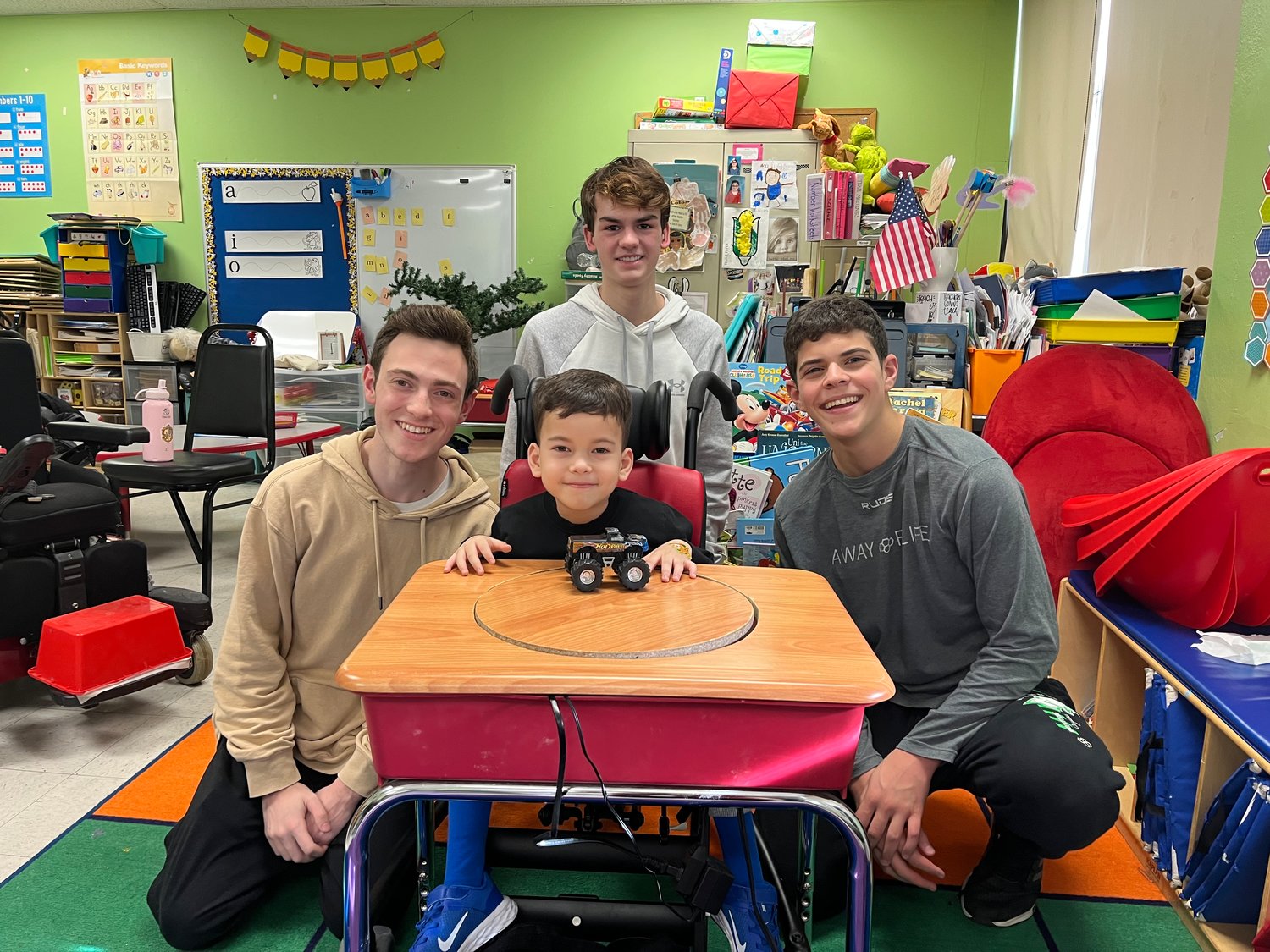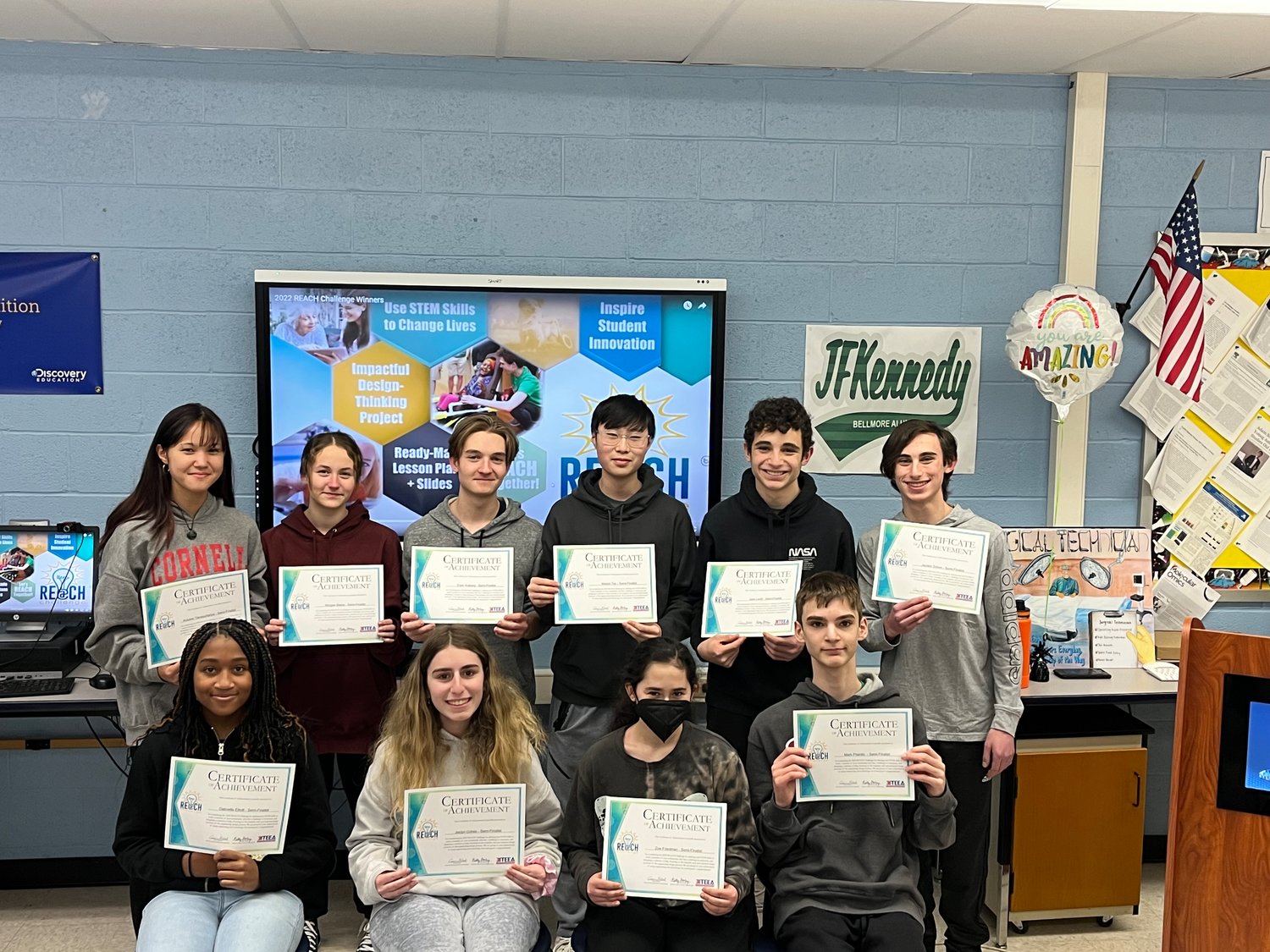Kennedy students earn national titles in 2022 REACH Challenge
Not only creating, but seeing the difference
From creating an adaptive desk for a young boy with a disability to inventing a coin calculator for a man with Down syndrome, two teams of students at John F. Kennedy High School have earned national recognition for their inventions.
The two teams participated in the International Technology and Engineering Educators Association’s REACH Challenge, with the goal of creating a project that greatly enhances the lives of someone in their community facing daily adversities due to a disability.
One of the teams in the school’s Advanced Science Research, or ASR, program earned first place in the national 2022 REACH Challenge, while the other was named a semifinalist.
The REACH Challenge requires students in STEM programs in middle school, high school or college to design and create an adaptive and assistive piece of technology that helps a member of their community overcome a challenge they face in their everyday lives.
While Kennedy has had teams participate in the challenge in previous school years, this was the first year enough students showed interest, resulting in two teams actually being formed, ASR teacher Barbi Frank said.
Everything from research to mechanical engineering skills contribute to the success of a REACH Challenge team, and since the beginning of the school year, the two Kennedy teams worked tirelessly to bring their creations to life.
The winning team received a STEM grant of $1,000, as well as $100 each for the school’s ASR program, gift cards and additional STEM supplies. Team leaders were invited to receive their award at the educator association’s 85th annual conference from April 12-15 in Minnesota.
EasyREACH 360
The winning team comprised Maxwell Frank, Preston Bowman, Cole Wasserman, Minami Rodger, Ellie Gelman, Ella Cullin, Dylan Friedman, Ava Goldsmith, Claire Schwartz and Chris Kuhl. They developed an adaptive desk, called the easyREACH 360, to help Andrew, a 5-year-old boy with spinal muscular atrophy.
Some of this team’s members competed in the REACH Challenge last year and were named national finalists. Frank said they wanted to put their design skills to the test, to see if they could, once again, make a difference in someone’s life.
Last summer, Frank contacted the Children’s Learning Center in Roosevelt, a school that offers education and treatment to children and adults with a wide range of physical disabilities. He asked if the center knew someone who could benefit from the REACH Challenge, and the students were introduced to Andrew.
“Because of his disability, he has a very limited range of motion with his forearms,” Goldsmith said. “He has a very difficult time reaching items of his desk.”
The desk they developed incorporates a turntable, which he can control using an adaptive switch to bring objects, which are out of reach, closer to him. The adaptive desk could turn both clockwise and counter clockwise, and the switch the team created, Wasserman added, is so adaptive that it can be modified to aid in the use of other devices.
“We were able to impact his life,” Frank said. “We dropped it off and after we left, we walked by his classroom and we saw him showing it off to his friends and calling his teachers over.”
Bowman added, “It was one of the cutest things I’ve ever seen. You don’t realize when you’re making it. You hope it’s going to have an impact on this person’s life, but you don’t really understand you’re really changing someone’s life.
“This is a struggle he has been facing his entire life,” Bowman continued, “and we were able to just make it a little bit easier for him.”
The Coin Calculator
The semifinalist team was made up of Mark Prainito, Jaclyn Cohen, Zoe Friedman, Autumn Tienauchariya, Jack Levitt, Mason Tso, Evan Kolberg, Gabriella Elliott, Jayden Simon, Max Guo and Morgan Beers. They worked with Matt, a 38-year-old man with Down syndrome, who was unable to differentiate coins while shopping, and thus they created the Coin Calculator.
Levitt said the team learned about his struggles from Jamie Kanner, a Kennedy High School graduate and teacher in the Merrick School District, who runs an athletic program, Shooting Stars, for children and adults with special needs. Levitt volunteers with Shooting Stars and was introduced to Matt’s parents.
“His parents said that one of the biggest issues he has is the ability to go to the store and count coins, so he always has to go with his parents,” he said.
The team created a plastic device that consisted of color-coded slots that could dispense coins. Using several computer-coded software, they developed an app in which whenever the users put in an amount of money that they need, the device indicates which coins to pull based on color.
Simon said Matt’s parents were overwhelmed with how useful the tool would be.
“It was amazing just to see their reaction even before we gave it to them,” he added. “They were already so excited.”
Seeing him use the device was incredibly rewarding, the team members said.
“Obviously we had the goal of helping someone but we didn’t really realize the extent to which something as minimal as this can actually make a difference in someone’s life,” Prainito said. “We could tell it was actually going to make a difference.”

 44.0°,
Mostly Cloudy
44.0°,
Mostly Cloudy 








